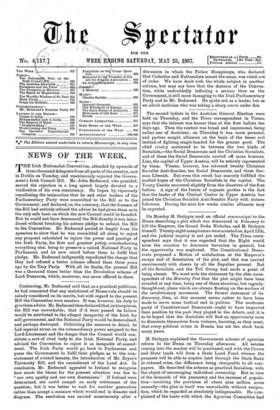M. Stolypin explained the Government scheme of agrarian reform to
the Dame on Thursday afternoon. All estates coming into the market will be purchased, and with the Crown and State lands will form a State Land Fund, whence the peasants will be able to acquire land through the State Bank at reduced rates, the difference being chargeable to all rate- payers. He described the scheme as practical Socialism, with the object of encouraging individual ownership. But in view of the demands of the peasantry and the increase of popula- tion—involving the provision of about nine million acres annually—the plan in itself was unworkable without emigra- tion, which he regarded as absolutely indispensable. He com- plained of the haste with which the Agrarian Committee had committed themselves to the principle of expropriation without consulting the Ministry, and declared that the Government would accept no scheme based on that principle. The Socialist demand for land nationalisation was not only revolutionary, but impracticable; that of the Constitutional Democrats— which proposes expropriation when necessary at a fair, but not at the market, valuation—was inequitable and dis- ingenuous. If private landowners were to be expropriated, why should the peasants be excepted ? He therefore preferred the Socialist proposal as more honest. The Government was not for half-measures, but was resolutely opposed to the forcible dispossession of one hundred and thirty thousand private landowners. In conclusion, the Premier remarked: " We do not believe in a grand panacea ; we want a grand appeasement." M. Stolypin spoke with his usual moderation and good sense, and, assuming the correctness of his figures, he made out a strong case for the Government policy. The Premier's speech was cheered by the Right, but the acceptance of the Government measure, and with it the existence of the present Dams, depend on the readiness of the Constitutional Democrats to modify their views, and this at the moment seems unlikely.



































